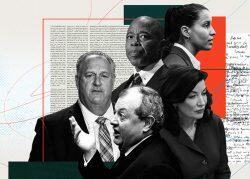As New York City’s economy recovers from the pandemic, a trio of Manhattan lawmakers is pushing to suspend their borough’s commercial rent tax.
City Council members Keith Powers and Gale Brewer and Manhattan Borough President Mark Levine introduced legislation Thursday that would halt the 3.9 percent surcharge for three years.
The pause would help keep struggling Manhattan establishments afloat and spur the city’s ongoing recovery from Covid, the lawmakers said.
“Relieving the commercial rent tax puts money back into the pockets of struggling business owners,” Powers said. “Our city’s recovery is contingent on Manhattan — we need to be doing everything possible to support these establishments as owners work tirelessly to pay bills, bring back customers, and keep their doors open.”
The measure has the support of groups such as the Manhattan Chamber of Commerce and the NYC Hospitality Alliance. They and other business interests have campaigned for years against the tax, a rather unusual levy imposed on larger businesses south of 96th Street.
Read more


The proposal comes as New York City slowly bounces back. Covid has forced about 26,000 businesses in the city to close, The City reported.
Almost three out of every 10 jobs lost in New York City during the pandemic have not come back — compared with about one out of every 10 nationally. The city’s unemployment rate dropped to 6.5 percent in March, but remains almost 3 percentage points higher than the national rate.
Manhattan’s commercial rent tax was enacted almost 60 years ago to generate revenue for the city. Lawmakers have scaled back the tax’s scope in recent years: The City Council in 2017 exempted about 2,000 businesses from the surcharge.
The law spared from the tax all tenants that make $5 million or less in annual income and pay less than $500,000 in annual rent. The commercial rent tax previously applied to occupants who paid more than $250,000 in rent per year.
The legislation also provided a partial, sliding credit to commercial tenants that made $5 million or less and paid between $500,000 and $550,000 in annual rent, as well as to businesses that brought in between $5 million and $10 million and paid less than $550,000 per year.
However, efforts to do away with the unpopular tax entirely have failed, largely because mayoral administrations did not want to give up the hundreds of millions of dollars in revenue it produces. In fiscal 2015 it yielded $720 million, or 0.9 percent of the city budget.
The Adams administration and City Council are negotiating the fiscal 2023 budget, which is due this month.
Two years ago, Powers introduced legislation in City Council to temporarily repeal the commercial rent tax for the remainder of the Covid state of emergency.
